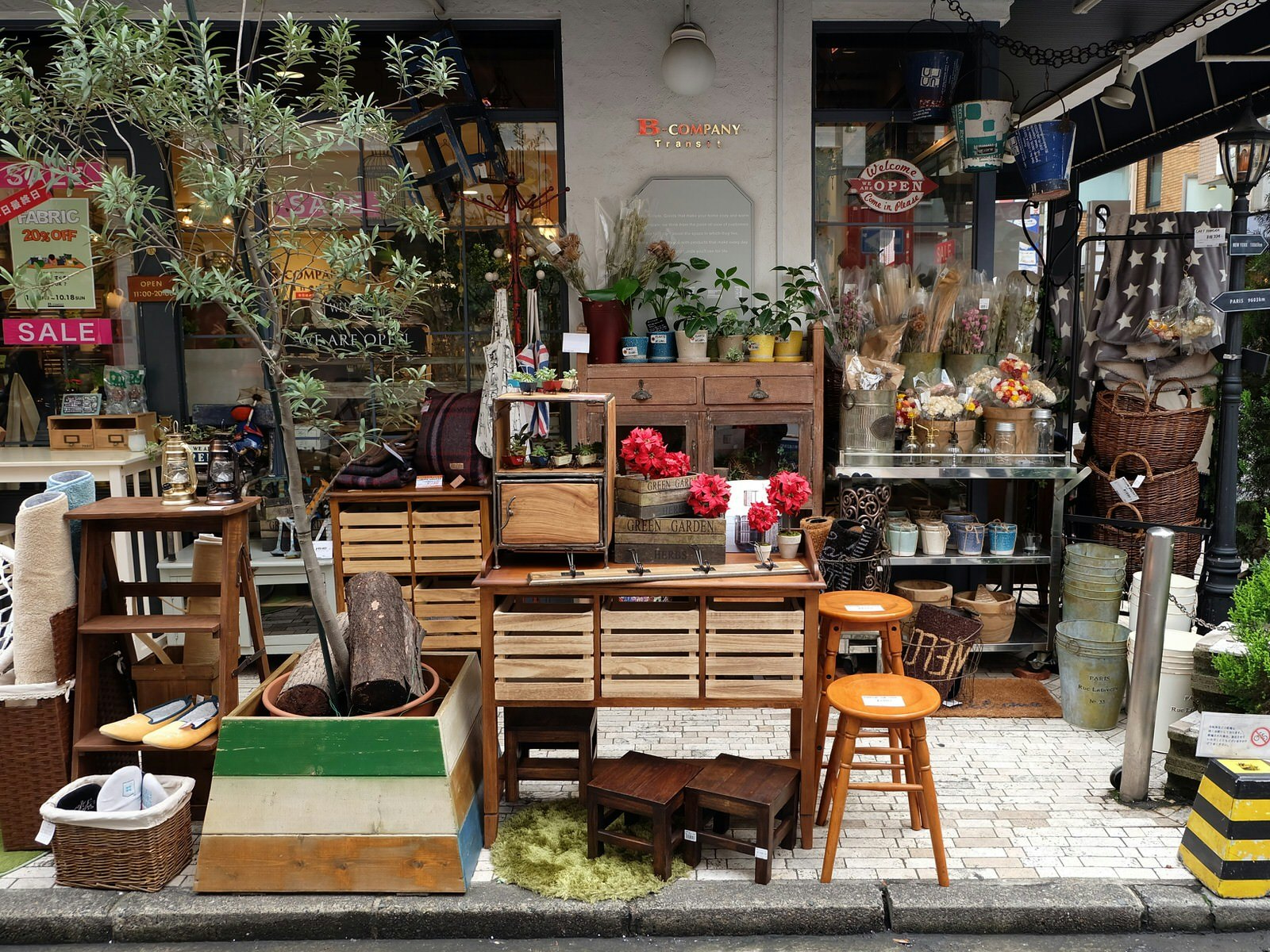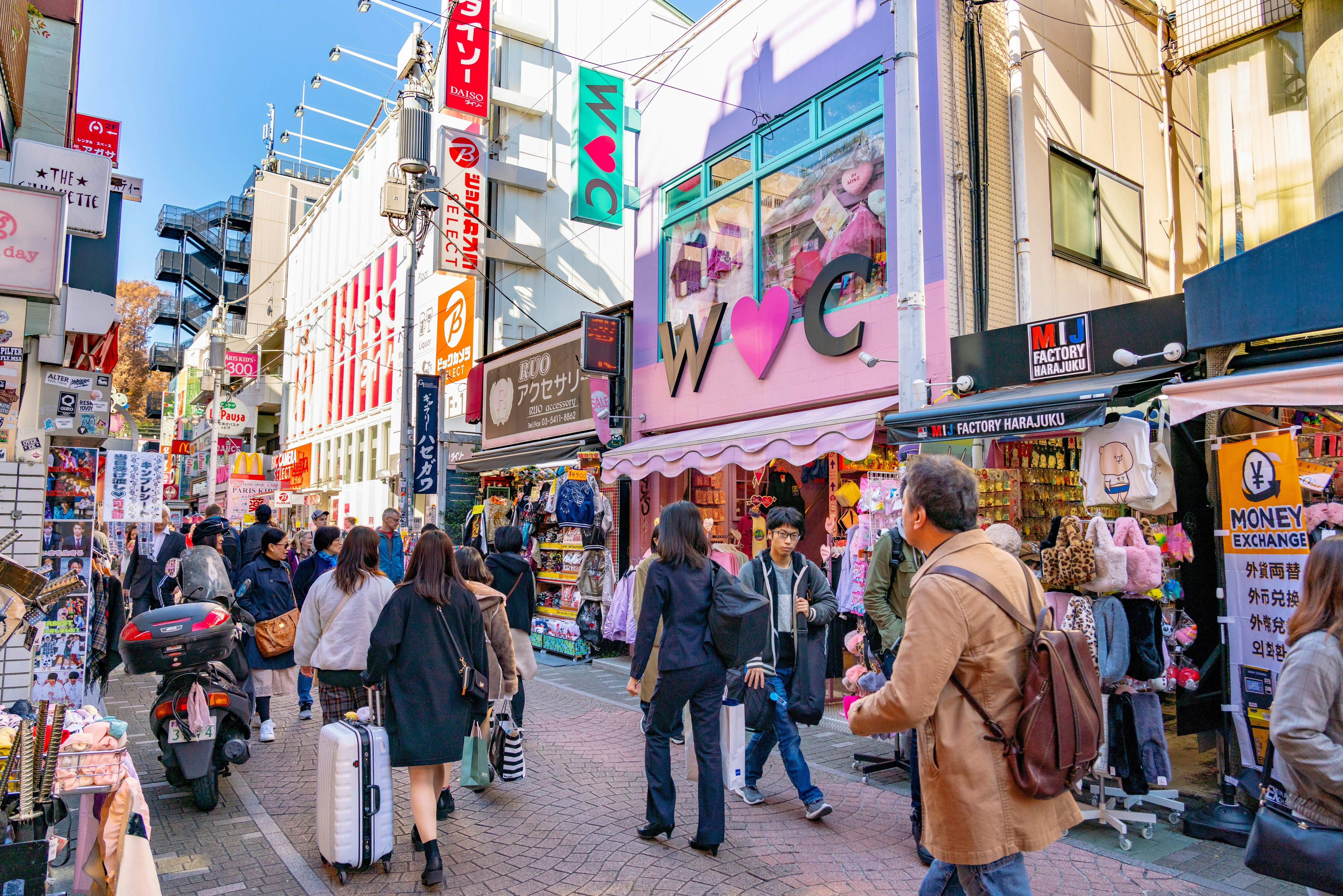
The 30 best countries, cities and regions to visit in 2025
Sponsored by

Mar 14, 2024 • 7 min read

Whether you prefer department-store browsing or rummaging for secondhand treasures, Tokyo has it all © Shutterstock
Tokyo shopping has it all: high-end and offbeat fashion, traditional crafts and vintage wares, all manner of only-in-Japan souvenirs, and that gadget you didn't know existed but now desperately want.
Whether you prefer department-store browsing or rummaging for secondhand treasures, read on to discover which Tokyo neighborhood meets your shopping needs.

The Asakusa neighborhood was once the heart of Edo’s low city, home to artisans and merchants. Travelers still flock here in droves to see Sensō-ji, Tokyo’s oldest Buddhist temple, but the small lanes and winding alleyways are full of surprises, including the vintage curios at Tokyo Hotarudo and the ceramics and lacquerware at Yamakichi. For straight-forward gift shopping, Nakamise-dōri (leading up to the temple) is good for souvenir trinkets – try the back streets for fewer crowds and better-quality items. Marugoto Nippon sells meibutsu (regional specialties) from Japan’s 47 Prefectures – these can range from pickled seaweeds and rosemary-scented salts to rare sake and craft wine – while the long stretch of Kappabashi-dōri is renowned in the foodie community for its abundance of culinary-supply shops.

Ginza is one of Tokyo’s most affluent shopping districts, home to upmarket boutiques and gleaming department stores, such as the classic Mitsukoshi and avant-garde Dover Street Market Ginza. There’s also the glitzy high-fashion mall, Ginza Six, with the delightful Imadeya Ginza sake store, the “Liquor Beacon of Ginza,” located in the basement (you can try several varieties before you buy). But tucked in between some of the more imposing facades are simpler pleasures, like the fine crafts at Takumi, the cigar collection at Davidoff of Geneva Ginza Shop, and the nine floors of stationery and art supplies at Itōya. There’s plenty to keep you interested on a shopping trip in Ginza, but it’s not recommended on a shoestring budget.

Once a drab warehouse district along the Sumida-gawa (Sumida River), Kuramae has been refashioned as the place for young artisans to set up shop. Check out Camera for leather goods (and coffee); Maito for clothes colored with traditional, natural dyes; and Kakimori, where you can design your own notebook and ink color. Stroll around the district and you’re bound to find more boutiques with one-of-a-kind goods.

Just west of Shinjuku, Kōenji is a bastion of counterculture with lots of secondhand shops and unusual finds. Don't miss the collection of street fashion stores inside the ramshackle Kita-Kore Building and the coveted vintage goods at easy-to-miss Sokkyō. Travel further west on the Chūō line to hit Kichijōji, which is a popular place to trawl for homewares. Start with the boho objets at Outbound and the antique ceramics at Puku Puku. There are some good jazz bars here too – use them as an inspiration before perusing the record collection at Disk Union Kichijoji Jazz Hall.

Daikanyama is a residential enclave of cafes and boutiques, full of fashion and accessories specialists such as Okura, which sells garments colored with traditional indigo dyes. Bibliophiles should head to Daikanyama T-Site – the store is a maze of literary genres, and has a great collection of photobooks and English-language novels by Japanese authors. Naka-Meguro, a stroll away, is Daikanyama's more bohemian neighbor; home to secondhand stores, trendy cafes and hidden lounge bars. Vase, with its vintage pieces, is among the clothes-shopping highlights here. Or head to Vendor for modern Japanese fashion brands.

Shibuya is a fountain of teen trendiness in Japan. Anyone older than Gen Z might feel a little out of their depth here, but just cruise and amuse yourself in the madness. Music shops and cheap, outrageous apparel are everywhere, as are the hip kids who come to primp and pose. Check out the youth-focused fashion at Shibuya 109, underground designers at Candy, and don't miss browsing the floors of homewares, gadgets and accessories at Tokyu Hands. Gamers should consider Shibuya Parco, where you’ll find stores dedicated to Nintendo and Capcom merchandise, respectively.

Miyashita Park, which reopened as a shopping mall with a rooftop park and garden in 2020, is also worth spending some time in. Start off with an ice cappuccino and pastry at Bread, Espresso & Machiawase, or head to Miyashita Cafe for soft-serve ice cream. Check out the vibrant African textiles at Cloudy on the second-floor south concourse – the brand sends 10 percent of its proceeds for schools, lunches and education in Ghana. Or for something more quintessentially Japanese, head over to the GBL shop for its unique collection of Studio Ghibli souvenirs. You’ll also find Kith in here, one of Tokyo’s trendiest street fashion and sneaker stores, and popular brand shops, including Adidas, New Era, The North Face, Gucci and the world’s first flagship Louis Vuitton men’s store. The airy open spaces within the complex make navigating Miyashita Park a breeze, proving that the building’s designers, Nikken Sekkei, put customer experience, wellness and inclusivity at the forefront of their vision.

Southwest of Shibuya is the small neighborhood of Shimo-Kitazawa (aka Shimokita), a favorite haunt of students and arty types, with quirky shops, izakaya (pub-diners) and hole-in-the-wall bars. Stroll the narrow streets here to discover Tokyo's highest concentration of vintage-clothing stores – Haight & Ashbury, iot, Lost Boy Tokyo and the Desert Snow stores are among the best. Shimokita is also good for its record shops, like Flash Disc Ranch and Jet Set, and the mixed bag of stalls at the covered market Shimokita Garage Department.

The twin neighborhoods of Harajuku and Aoyama are home to the youthful shopping strip Takeshita-dōri and the stylish boulevard of Omote-sandō. Sophisticated high fashion rules the Aoyama end of Omote-sandō, while the experimental hipsters of Harajuku layer haute couture with vintage goods. And then there is Ura-Hara, the maze of backstreets behind Omote-sandō, where you'll find eccentric little shops and secondhand stores. There are countless shopping options: get started at Laforet, 6% Doki Doki and Sou-Sou for clothes and accessories; Gallery Kawano for vintage kimono; or RagTag for pre-loved fashion. If you’re on the hunt for rare sneakers, Worm Tokyo has arguably the best collection in the city.

Shopping in Shinjuku can be a little overwhelming. From the moment you step out of the train station, the lights and noise make the whole neighborhood seem like the interior of a bustling pachinko parlor, but there are some great shops amid all the chaos. Here you'll find Isetan, one of Tokyo’s most revered department stores; the something-for-everyone 'variety' store Don Quijote; and Disk Union, where music lovers can lose a day browsing the eight stories of secondhand vinyl and CDs. Bibliophiles should head to Kinokuniya Shinjuku South – there’s a fantastic collection of English-language books and manga here.

Akihabara is known as Tokyo's Electric Town district and it’s easy to see why with stores like Akihabara Radio Center, an organized scrapyard of electrical components, and Yodobashi Akiba, which is believed to be the largest electronics store in the world. The neighborhood is also a center for otaku (geeks) and their penchant for anime, manga and Japanese pop culture. Among the stores catering to the otaku crowd is the huge Mandarake Complex, while Super Potato and Retro Game Camp are bursting at the seams with video game nostalgia. Also in the area is the excellent under-the-train-tracks crafts bazaar 2k540 Aki-Oka Artisan.
More and more stores (especially department stores) offer tax-free shopping to foreign tourists spending over ¥5000. Bring your passport and look for the tax-free stickers in the window. See also enjoy.taxfree.jp.
Carry some cash with you: traditional and smaller stores may not accept credit cards.
Though bargaining is the norm in most of Asia, in Japan it’s not done, except at flea markets and the occasional electronics store.
Tokyo’s department stores have excellent basement food halls, called depachika, which are great for finding foodie gifts (or for a mid-shopping treat).
As a travel entertainment and inspirational media outlet, we sometimes incorporate brand sponsors into our efforts. This activity is clearly labeled across our platforms.
This story was crafted collaboratively between Miyashita Park and Lonely Planet. Both parties provided research and curated content to produce this story. We disclose when information isn’t ours.
With sponsored content, both Lonely Planet and our brand partners have specific responsibilities:
Determines the concept, provides briefing, research material, and may provide feedback.
We provide expertise, firsthand insights, and verify with third-party sources when needed.
Plan with a local
